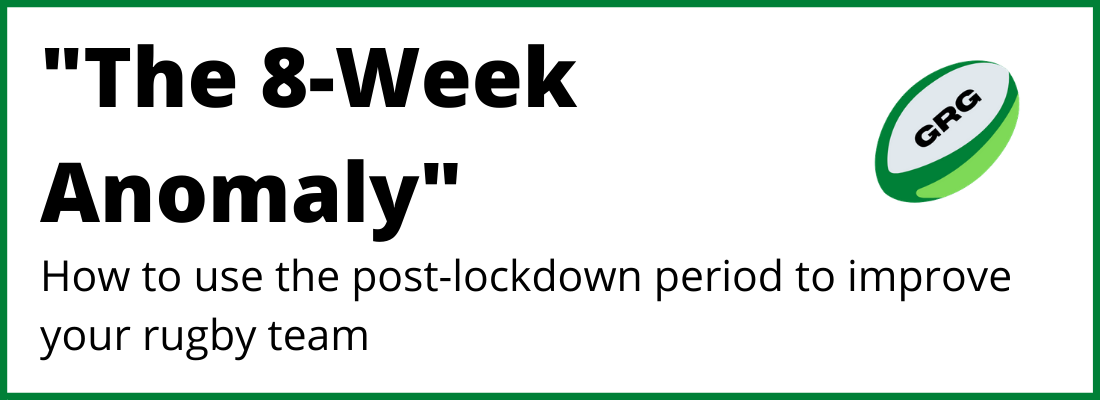It’s now been a week since England has been allowed to return to rugby and it’s been great to see all the photos and videos of clubs returning to training and people getting back to the sport they love. Lots of clubs are reporting increased numbers at their sessions. I imagine that a lot of people are desperate to be out exercising and socialising!
However, this eight week block (essentially April & May) presents an odd challenge. The RFU youth season ends on 31st May, although there are discussions about extending the range of permitted summer activity. For senior teams, they can play games over the summer but it remains to be seen how beneficial this might be.
In this article, we take a look at some of the ways a coach or team manager can get the most out of the time.
What do you want to achieve in the 2021/22 season?
It seems almost perverse to start thinking about next year before we’ve even really started, but with games not allowed until after April 26th, the chances of a satisfying season are slim. If we start thinking about next season, then we can start putting things in place now to achieve them.
Below are a couple of different scenarios of types of goals you might have.
Player Recruitment & Engagement Goals
The girls section I’m involved with has a number of players who have never played a game before, thanks to the cancellations. So our goal for this block is to get ourselves ready for a couple of games at the end of the year just to get them their first games and hopefully keep them interested and engaged for next year.
We put together a rough plan:
- April & first two weeks of May: training with a high focus on core skills and playing games (our older age groups train twice a week)
- last two weeks of May: two friendly fixtures with local clubs
- Summer: casual touch – so open for players to turn up or not as they wish
- Last two weeks of August (older age groups only): pre-season
This means our training looks a bit different from normal in-season training – we’re working almost exclusively on core skills and game-play, rather than on team structure and set piece. It helps that scrums aren’t part of the game for this period! We’re not overly concerned about the results of the games, we just want players to make their first tackles & rucks in a live environment, which will help them to prepare for next year. We imagine that the other teams will be in a similar spot anyway.
Once we get to the summer, we’ll be playing touch but on a “turn up and play” setting – so no real coaching, just a chance for our players to stay connected and have a bit of weekly exercise. It’s also a great chance to do some recruitment in a low pressure environment. We see it as a chance to find some new players and get them involved before we start again in September.
Player Performance Goals
If you’re involved in a team that takes its rugby more seriously, then your 2021/22 goals might include a performance aspect e.g. gaining promotion/avoiding relegation. With that in mind, how much value are you going to get from structuring your sessions exactly as you would mid-season? I’ve seen some teams talking about doing fitness programmes when the first league games are going to be five months away!
If you have performance goals, you probably have a style of play you’re looking to implement. Now would be a good time to look at your “limiting factors.” Limiting factors are the term we give to things that would stop us achieving our objectives. For example, if you wanted to play a wide passing game, a limiting factor might be one of your centres not being able to pass off both hands. This eight week block could be entirely dedicated to individual player development – improving the skillsets and vision/awareness of your players.
In a way, this mini season is like free time. There’s no competitions (for the most part) just a chance for players and coaches to get some training done. Put aside the pandemic for a moment – if all of your players had turned up for a pre-season significantly more skilful, as a coach you’d be ecstatic right? Ever had a training session where you wish your players could do XYZ better?
You’ve now got the time to develop those skills without the pressure of fixtures and all the team organisation and preparation that comes with it.
Avoiding Burnout
I had a great conversation with a fellow coach who has decided not to use all of the available eight weeks for a men’s 1st XV. At first I was surprised, but his reasons made a lot of sense. If you start training on the week of March 29th and keep going all the way through to the next season, you’re going to have players potentially looking at a 13-14 month season.
13-14 months is a LONG season. It doesn’t really matter what your goals are – whether they’re engagement or performance – you’re going to find players more likely to burnout. Imagine the scenario – you started working hard to make sure you’re ready for next year’s league season. By the time you’re hitting that crucial end of season period in February-April 2022, your players are picking up injuries and are mentally fatigued. Performances start to slip. That promotion spot becomes a playoff spot or worse, you don’t even make the playoff.
At the moment, everyone is really keen to be back on a rugby pitch – after all, we’ve missed the sport hugely during the lockdowns. However, one of your jobs will be to temper that enthusiasm and direct it in a meaningful way. In one of the examples above, we talked about having casual summer touch rather than an extended pre-season. The players aren’t necessarily ready for a break yet, but we’ll be reducing the number of sessions from two a week to one a week and reducing both mental and physical load on the players. The hope is to hit a good middle ground where we’re providing some rugby for players while they’re keen, but without overburdening them and potentially losing them at the end of the season.
I think that the most successful teams next year will be the ones that manage to hit this balance well.
Try (or plan) Something New
With nothing specific to play for or work towards, now might be a great time to experiment.
For some of the teams I’m working with, this involves setting up systems for next year. Some of those systems are on-field – things like up-skilling players and introducing them to new concepts, but for many, it’s also about putting things in place off the field to help us to restart our growth.
Conclusion
There’s a lot of value that you can get out of this eight week period, but it also presents the danger of making the next season too long.
For me, the solution is:
- Work out your goals for the 2021/22 season
- Have a think about what factors are needed to achieve these goals
- Start moving towards your goals
- Don’t overdo it – 2021/22 season could last a long time if you start now!

